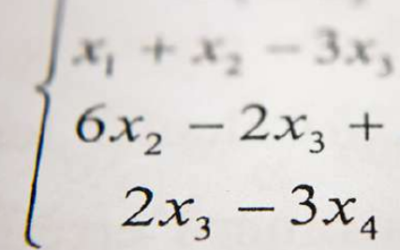“For as long as I can remember, numbers have not been my friend. Words are easy as there can be only so many permutations of letters to make sense. Words do not suddenly divide, fractionalize, have remainders or turn into complete gibberish because if they do, they are gibberish. Even treating numbers like words doesn’t work because they make even less sense. Of course numbers have sequences and patterns but I can’t see them. Numbers are slippery.” – Jess Blackburn Although it’s been estimated that 40% of dyslexic individuals are also dyscalculic, dyscalculia is rarely formally identified in schools. As neuroscience studies have uncovered more differences in mathematical processing, the problem of identification has not become simpler. But although it appears that there […]
Best Apps for Subject Knowledge [Premium]
Because of the work of reading dense text and the fact that skimming can be difficult (if not impossible) for students, reading and re-reading alone are often not the most efficient ways for students to study for exams or file information into their long-term memories. FLASHCARD APPS Many students know that flashcard apps work because they allow you to review key information without wading through a sea of text. The best apps allow you to review only the cards that you’re unsure of, and apps either come with common textbooks pre-loaded or allow you to upload PowerPoints, PDFs, word documents with information with a conversion into cards. You don’t have to write your own cards! Some students may even find that […]
Hands-on Math and Games with Ronit Bird [Premium]
Recently, I discovered the math activities of Ronit Bird. Ronit Bird is the author of several books about Dyscalculia. She has helpful tips for parents and teachers about concrete manipulatives and building up a sense of number through activities more than worksheets. I confess, I wish I had had this more when I was a kid. The tricky thing about math and activities even if you’re home schooling or home-enriching is that students who are weak in an area will often not want to do it, even if it’s something that would be beneficial for them to do. In our family, we had one child who was very, very good at all types of speed-based computer games, and another who was decidedly not good […]
The Double Whammy: Dyscalculia and Dysgraphia [Premium]
What happens when a student has both dyscalculia and dysgraphia? Be prepared for an educational path that has a timing of its own. Dysgraphia often accompanies dyslexia, but dyscalculia too. If you or your student has two or three out of these 3 “d’s” be prepared for a challenging course and a need for individualization for many years. The most typical presentation for dyscalculia relates to students who have trouble mastering the sequence of numbers and recall of basic math facts. When dysgraphia gets added to the mix, you can imagine how it may swamp working memory, causing students to lose track when they work through math problems. In a very real sense having both dyscalculia and dysgraphia also robs students of being able to […]
Algebra: What Students See and What Mathematicians See [Premium]
Ben Orlin is the author of Math with Bad Drawings and Change is the only Constant: The Wisdom of Calculus in a Madcap World. Besides have a good sense of humor, Ben is good at recognizing the differences in the way students and mathematicians see math problems. Take for example, the math problem, What is 7 x 11 x 13. What goes through your mind when you see a problem like that? I reach for my calculator, or might try 7 x 11 first, then look for a pen a paper, but what Ben suggests is that mathematicians imagine this. The following examples Ben shared about Algebra had me laughing aloud: The mathematician’s simplification involves recognizing a pattern. But […]
Extraordinary Artist: Vincent [Premium]
“When you have dyslexia and you don’t know that’s what it is, you assume you’re not intelligent — and your self-confidence is taken away.” – Vincent Fantauzzo Vincent grew up in a crowded public housing flat with his mother and four siblings. He left school at 13, barely able to read and write, and got mixed up in street fights and general delinquency. “I spent my life hiding and hustling, feeling ashamed, not being good enough, not being smart enough and pretending to be someone I wasn’t…” – Vincent Fantauzzo While he was in school, Vincent remembered wanting to get kicked out of class rather than stand up and read aloud. He wondered why other students could read and he could not. “You can be dyslexic […]
Keeping Math Alive
Among the many challenges facing dyslexic students in the midst of the pandemic is holding on to skills and continuing to make progress in the midst of disruptions and altered schedules due to the pandemic. Because so much math builds on previous knowledge, many...
Talking Through Math [Premium]
As the pandemic continues, more and more parents and tutors may find themselves supervising students’ math. For dyslexic students, the talking process can be especially valuable, but it may be difficult. If you are a parent or tutor helping explain a lesson or homework, it’s good to help your student talk through the steps of math; this may be especially difficult for some students. If a student has trouble finding words or has a limited working memory, talking through math may be difficult for a while until either or both of these functions develop. Such students may especially benefit when YOU talk through math, slowly and precisely. There are also ways to make the talking process easier – like having a list of math vocabulary […]
How to Avoid the Pandemic Wrecking Ball
The Boston Globe recently published an article saying that COVID-19 has been a wrecking ball for students struggling to read: "Instead of reading, we got websites and circle time.” "Daniel’s progress came to an abrupt halt after Medford Schools closed down in...
Reading and Mathematics [Premium]
“Mathematics texts are more conceptually dense than almost any other type of text…Additionally, reading mathematics often differs from other types of reading because in addition to reading left to right and top to bottom, students must jump around the page to associate text with tables, graphs, symbols, and vice-versa…” The subject of reading in math class often receives very little attention in explicit instruction, because most math teachers receive little training in the specific needs of dyslexic students; in some cases, neglect of these needs may the primary reason that students underperform in this important school subject. Math teachers get little or no instruction in teaching students with dyslexia, although dyslexic students are likely to comprise 1 in 5 of their students. “…many mathematics textbooks […]
Not Falling Behind in MATH
"The studies vary in how severe they gauge the so-called “COVID slide” to be, but all of them found on average, students would lose more ground in math than in reading. Three studies based on NWEA data predicted students could learn half or up to a full year less math...
Schooling From Home, Can You Do It?
Like it or not, when Fall rolls around, many of us may need to school from home whether it's our first choice or not. What if your student is dyslexic? Can it possibly work? There are a lot of people who can't see schooling from home working for their student, but...

![Discrepancies in Math [Premium]](https://www.dyslexicadvantage.org/wp-content/uploads/2021/08/Discrepancies-in-Math-5-400x250.png)
![Best Apps for Subject Knowledge [Premium]](https://www.dyslexicadvantage.org/wp-content/uploads/2021/07/Subject-Knowledge-0-scaled-e1626619775646-400x250.jpg)
![Hands-on Math and Games with Ronit Bird [Premium]](https://www.dyslexicadvantage.org/wp-content/uploads/2021/07/Math-Games-5-400x250.png)
![The Double Whammy: Dyscalculia and Dysgraphia [Premium]](https://www.dyslexicadvantage.org/wp-content/uploads/2021/06/Dysgraphia-and-Dyscalculia-400x250.png)
![Algebra: What Students See and What Mathematicians See [Premium]](https://www.dyslexicadvantage.org/wp-content/uploads/2021/06/Algebra-1-400x250.png)
![Extraordinary Artist: Vincent [Premium]](https://www.dyslexicadvantage.org/wp-content/uploads/2021/04/Vincent-317x250.png)

![Talking Through Math [Premium]](https://www.dyslexicadvantage.org/wp-content/uploads/2021/04/Talking-Through-Math-Dyslexia-318x250.png)

![Reading and Mathematics [Premium]](https://www.dyslexicadvantage.org/wp-content/uploads/2021/03/Frayer-Model-390x250.png)















